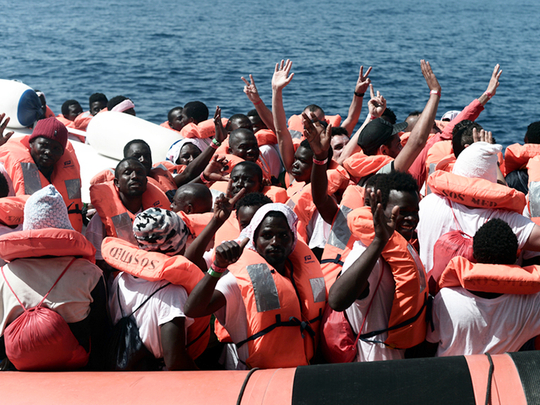
PARIS: French President Emmanuel Macron said on Thursday populism was spreading across Europe like a disease that Europeans should fight more vigorously instead of criticising the actions of pro-European governments like his.
The 40-year old leader has come under pressure at home for not accepting the Aquarius migrant ship that far-right Italian Interior Minister Matteo Salvini turned away from Italian ports, prompting a war of words between Paris and Rome.
On a visit to Britanny, a particularly pro-Europe region, Macron urged commentators to fight those who “hate Europe” rather than attacking him. “You can see them rise a bit like a leprosies all across Europe, in countries where we thought that would be impossible to see them again, in neighbouring countries,” Macron said. “They’re saying the worst things, and we’re getting used to it. They’re making provocations, and nobody is horrified by that,” he added.
- Emmanuel Macron | French President
The row between Paris and Rome over the fate of the Aquarius, a ship with more than 600 migrants aboard, including women and children, drew in Pope Francis and sewed division across Europe, straining German Chancellor Angela Merkel’s fragile coalition.
“We accuse Europeans to not be exactly how we’d like them to be, and we forget to denounce those who no longer are like us, those who hate (Europe) and are advancing their plans,” Macron said. “We’re getting used to the extremes in countries who for years had been pro-European like us, and on this issue our business, journalistic and political elites have an immense responsibility,” he added.
The European Union’s top migration official meanwhile said the EU wants to screen migrants in centres in northern Africa to see whether they are eligible for asylum and prevent people trying to enter Europe by boat.
- Angela Merkel | German Chancellor
Migration Commissioner Dimitris Avramopoulos said on Thursday that the bloc wants to open “regional disembarkation platforms” in countries like Algeria, Egypt, Libya, Morocco, Niger and Tunisia. Avramopoulos said “we would like significantly to intensify our cooperation with these countries.” He said that in return they would receive “increased financial and material support.”
None of the countries has yet agreed to take part. The UN refugee agency says that around 40,000 people have arrived in Europe by sea so far this year, landing mainly in Italy, Greece and Spain.
Leaders from a group of European Union countries, led by Germany and France, will meet Sunday to thrash out possible solutions to a divisive row over migrants. Merkel is expected to join the leaders of Austria, Belgium, France, Greece, Italy, Malta, the Netherlands and Spain for “informal talks” at European Commission headquarters in Brussels. The Commission said Sunday’s meeting, just days before a full EU summit June 28-29, is aimed at “finding European solutions” to the migrant challenge.
Tougher checks at train and bus stations are among the actions participating countries are considering as part of efforts to stop asylum seekers from travelling freely across Europe’s open borders.
German media reported Wednesday that the proposal is part of a draft agreement being circulated ahead of the meeting of leaders from the 10 countries. The daily Suedeutsche Zeitung newspaper said the draft also foresees penalties for asylum seekers who don’t remain in the first European Union country where they are registered. German business newspaper Handelsblatt said the proposed agreement also foresees a significant expansion of the EU’s border control force, Frontex and the creation of an asylum processing agency for the entire bloc.
German Chancellor Angela Merkel wants an EU-wide agreement on how to deal with migrants to avoid the chaos seen during the 2015 influx. Austrian Chancellor Sebastian Kurz, whose country takes over the EU’s rotating presidency on July 1, said the gathering “is not about German domestic politics, it’s about a solution of the migration question that is long overdue.” Kurz said it will address issues like “how we protect the (EU) external borders, how do we prevent waving (migrants) through to central Europe.”












